India’s departing high commissioner said he had no involvement in the criminal activity the RCMP has alleged to be linked to Indian government agents and denied playing a role in the murder of a Sikh separatist on Canadian soil.
High Commissioner Sanjay Kumar Verma told CTV News in an interview aired on Oct. 20 that his country “never” targeted anyone for killing and that he condemns the murder of Hardeep Singh Nijjar. Nijjar, who had helped organize a non-binding referendum to create an independent state of Khalistan and secede from India, was murdered in June 2023 in Surrey, B.C.





